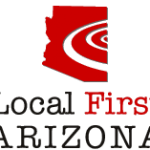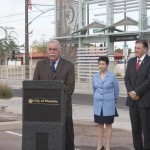Local First Arizona (LFA) has launched “Shift the Way You Shop,” a campaign aimed at strengthening the local economy, increasing civic pride, and changing consumer buying patterns to increase the economic and cultural sustainability of the region. During this economic downturn LFA has identified a plan that will assist in economic recovery. It will also improve our environment, create jobs and enhance community development.
To celebrate all of the wonderful local businesses in the valley, Local First has partnered with METRO to create a light rail wrap and a full marketing campaign to run through the holidays that will include a mobile app which riders can use to find any locally-owned retail store, restaurant or entertainment within ½ mile of each light rail stop. The mobile app is free and is available at the mobile Shift the Way You Shop website.
“Many people don’t realize how many locally owned businesses are located near the rail,” explained Kimber Lanning, Executive Director of Local First Arizona, “and that choosing a local businesses to patronize means residents are keeping more money right here at home in Arizona.” Lanning cites several studies that prove that buying locally actually increases community wealth and creates jobs.
For the launch, several notable people in the valley will identify their favorite light rail stops and join riders, local first fans, and others to ride and explore their community.
In Tempe, Councilmember and METRO Board member Shana Ellis will join Local First for a “ride along” where guests and riders will be encouraged to visit her top two light rail stops in Tempe: the Mill Avenue/Third Street station and the Tempe Transportation Center (Veterans Way/College Avenue). Kimber Lanning of Local First will act as tour guide and will offer up bits of history, interesting landmarks, and great new businesses that have opened in the Tempe area.
Those interested in joining the fun should meet at the METRO Light Rail Dorsey/Apache Boulevard station at 5PM and ride to the Tempe Transportation Center on October 12. The group will be visiting such Tempe establishments as House of Tricks, Here on the Corner, and Canteen and will learn about biking opportunities, community gardens and other little known gems about Tempe.
In Phoenix, Councilmember and METRO Board Chairman Tom Simplot will host stops at Osborn/Central Avenue and Washington/Central Avenue, which are his two favorite stops on the line. Guests will visit an urban living environment along with great infill projects like Hanny’s, Cartel Coffee and more. Again, Kimber Lanning will act as tour guide and will offer up little known facts and history about the Phoenix area. Interested riders should plan to meet the group at METRO Light Rail Central Avenue/Cameback station at 5 PM on October 18th.
Local business hero Craig DeMarco will also be doing a “ride along” which will visit his two favorite stops on the rail, Van Buren/1st Avenue and Central Avenue/Camelback. Some of the businesses on DeMarco’s tour include the Crescent Ballroom, Civic Space Park, Cowtown Skateboards and more. Interested riders should plan to meet the group at Phoenix Public Market at 5 PM on October 20th.
Prizes will be given away to some lucky riders, so join in the fun and explore the community by learning more about the local businesses that make us proud to call the Valley home. Lanning says, “We’ll even be spreading the word about great local deals like where you can buy a great locally made lunch for only $5.99.”
”Local businesses are assets to our line,” said METRO CEO Steve Banta. “The partnership with Local First Arizona is another opportunity for us to connect with these businesses and provide value to our transit riders.”
Shift the Way you Shop was inspired by a study that was recently completed in Grand Rapids, Michigan, that examined the spending patterns of residents and businesses. The study determined if all 600,000 people in Grand Rapids county simply shifted 10% of their spending from national to local businesses, the result would be 1600 new jobs, an additional $130 million invested in the local economy and an increase of $50 million in local wages within one year.







